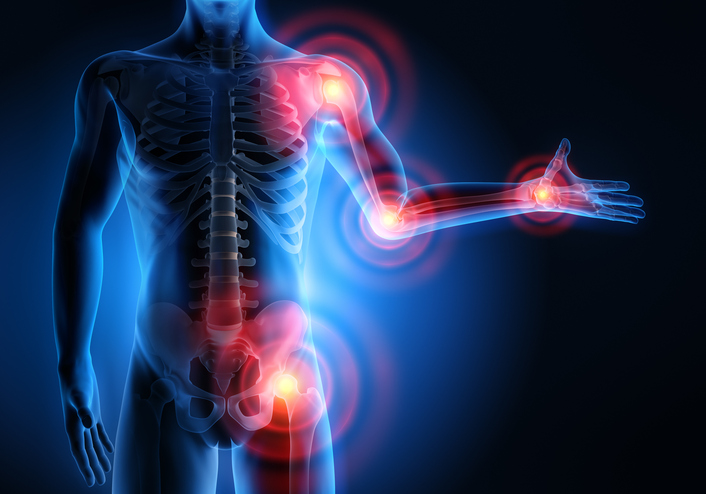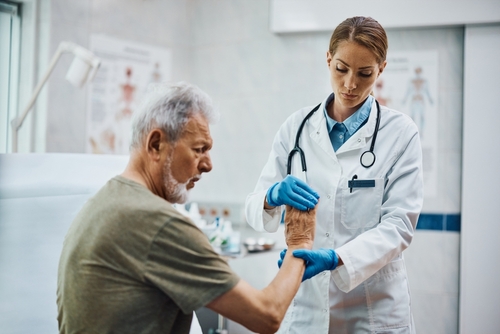Dr. Nowell Discusses Which PROs Are Most Important To Rheumatology Patients
By Kaitlyn D’Onofrio - Last Updated: April 28, 2023Benjamin Nowell, Ph.D, Director of Patient-Centered Research, CreakyJoints, and principal investigator of ArthritisPower, discusses the results of a new study, “Which patient-reported outcomes do rheumatology patients find important to track digitally? A real-world longitudinal study in ArthritisPower,” published in Arthritis Research & Therapy.
DocWire News: What prompted you to undertake this study?
Dr. Nowell: ArthritisPower was set up under the principles of patient-centered outcomes research. And what that means is that it’s very important to identify what information patients find important and useful in their own health decision-making. And so, identifying which outcomes are most meaningful and relevant to patients for that decision-making is very important. So in arthritis, we wanted to be able to identify the symptoms/patient-reported outcome measures (PROMs) that were most meaningful and relevant for patients. That way, the patients ultimately will use that information that other studies generate using those outcomes, and use that evidence in their health decisions. And hopefully ultimately, it’ll help people better manage their disease and achieve their goals.
DocWire News: What are the key takeaways from the study?
Dr. Nowell: We track patients over a number of months and ask them initially to select which symptoms or which PROMs they wanted to track over time. And then, at each month mark, they were able to just keep tracking the same ones, or they could remove some and add others or remove them. So they needed to track a minimum of three and a maximum of 10. What we found was that on average, the mean number that people chose to track was seven. The most important symptom was pain. That was chosen most often overall, about 83%, that was split across two different pain measures.
Fatigue was also very important. About 78% of participants chose to track that. Physical function was also very important, and so was the duration of morning joint stiffness for arthritis patients. It was also interesting that there were a number of measures of mental health or emotional distress that were also commonly selected. At least one of the PROMIS (Patient-Reported Outcomes Measurement Information System) mental health domain measures was selected by about 82% of participants.
DocWire News: Did any of the study’s findings surprise you?
Dr. Nowell: I think what was surprising a little bit was that we included specifically for our rheumatoid arthritis (RA) patients, an option to select the flare measure. Patients often talk about whether they’re having a flare-up of their RA. And so, we made that available. It turned out that although initially a pretty high percentage of the RA patients in the studies selected the OMERACT RA flare measure to track over time—about 70, 78% of participants initially selected that. By the final month of the study, at the end of month three, only about 15% were still choosing to track the RA flare measure. So I think that was kind of surprising.
And I think what we can infer from that is that patients actually like to track things that are very clear and understandable, like a single symptom. The RA flare measure, that particular one is a composite measure. So it includes things like pain and fatigue, and ability to do daily activities and so on. But what we’ve found, and I think that was a little surprising, was that patients actually were choosing to track things that were a little more straightforward, easily comprehensible, like fatigue, pain, physical function. The other thing that was somewhat surprising was that we had heard anecdotally that it was important to include a measure of sexual function and satisfaction. But almost no one selected that measure to track over time.
DocWire News: What limitations did the study have?
Dr. Nowell: So there’s some selection bias because all of the participants in the study were members of ArthritisPower, of the Patient-Powered Research Network, a patient registry where patients self-select to participate in that network. So, like any technology-based registry, there’s going to be some features of the sample. The demographics of the sample may not be generalizable to people with limited access to technology, for example. We also recognize that although we had some interesting contrast between diseases, for example, people with RA were more likely to, or chose, the fatigue measure at a higher proportion than those with osteoarthritis. Overall, we had low participant numbers broken down by individual conditions. So, it’s difficult to make any inferences among those subgroups.
DocWire News: Do you have any future plans to research this area?
Dr. Nowell: Yeah, we plan to definitely continue incorporating PROMs into the studies that we’re doing. And of course, what this does for us is it helps us prioritize the symptoms or the measures that the patients find important. So the ones that were selected here by the participants in the study will be the ones that we certainly want to continue to include in studies that we do. We’re also comparing data from wearables, like wearing a smartwatch or a Fitbit or an Apple watch. So we can compare the data that we get like daily step count, minutes of sleep and so on, to see what associations there are with PROMs like pain and physical function, and see how those lineup with measures that we can capture passively from wearables.
DocWire News: Any information not addressed by the previous questions that you would like to share?
Dr. Nowell: I think what’s also important to recognize about the study is that it shows the feasibility of conducting a longitudinal trial virtually with digital measures using a smartphone. So, all of the participation in this study was done remotely. So, no one came in for any clinical visits. Everything was completed on [the] patient’s smartphone. So, it just demonstrates that this kind of a study is possible to do, and possible to do over time.







 © 2025 Mashup Media, LLC, a Formedics Property. All Rights Reserved.
© 2025 Mashup Media, LLC, a Formedics Property. All Rights Reserved.